Is GMO-free food safe?
The shocking answer is NO. Sadly, GMO isn’t our only health risk. Monsanto’s toxic pesticides and herbicides like Glyphosate are widely used on both GMO and non-GMO foods. To be safe and chemical-free, we need to eat 100% Organic. This article shows surprising new scientific research, clearly linking many common chronic diseases to Glyphosate. While correlation does not imply causation, scientists used the Pearson product-moment correlation coefficient (a measure of the strength of the linear relationship between two variables) to analyze the relationship. They found a very high level of correlation and P-value between certain chronic diseases and the growing use of the herbicide Glyphosate on crops, including non-GMO crops.
Several courageous scientists have completed studies of disease trends, and the news is shocking. This is the stuff we don’t read in the papers. The World Health Organization (WHO) is aware and trying to resolve the issues. The Center for Disease Control (CDC) is also aware, but is doing much less to resolve them. This article will synthesize these recent scientific studies.
Executive Summary
16 Chronic Diseases Caused by Glyphosate, 16 More Reasons to Eat 100% Organic
Ever since the World Health Organization labeled Monsanto’s herbicide Glyphosate a possible carcinogen in 2015, several courageous scientists have been working to document its specific effects on human health, clearly correlating it to increases in disease. The 16 reasons to eat 100% organic are: 1) Autism 2) Obesity 3) Diabetes 4) Alzheimer’s disease 5) Celiac disease 6) Hypertension 7) Infertility 8) Cancer 9) ADHD & Brain function 10) Multiple sclerosis 11) Auto-immune diseases 12) Depression 13) Heart disease 14) Kidney disease 15) Inflammatory Bowel disease and 16) Parkinson’s disease. All these chronic disease are on the rise directly parallel to the increasing use of Glyphosate on crops.
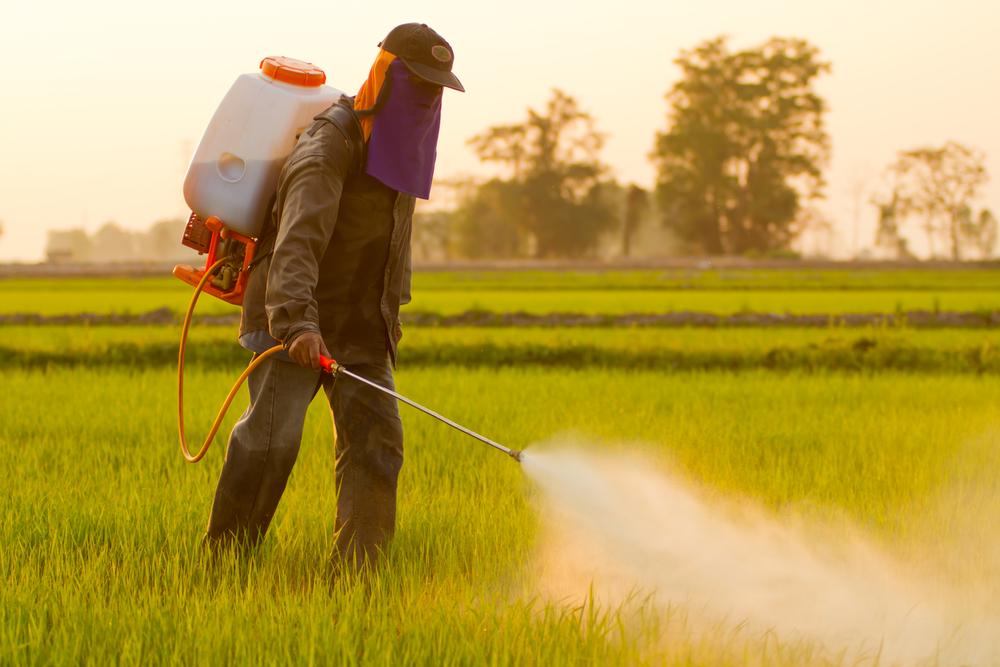
Glyphosate Destroys Gut Bacteria: Foundation of Your Immunity and Brain Function
We depend on our intestinal bacteria in many ways. Glyphosate herbicide is an antibiotic that preferentially kills the good bacteria in your gut. Very Bad. Glyphosate causes a complex chain of chemical events connecting the brain and gut. For example, neurological damage from Glyphosate impairs the brain’s ability to eliminate heavy metals and other toxins, which in turn blocks the pineal gland, causing a brain pattern that leads to Autism and Alzheimer’s disease. Glyphosate disrupts the gut bacteria’s ability to produce needed amino acids, and this in turn causes nutritional deficiencies that affect brain function. Glyphosate reduces the body’s ability to fight lymphoma, cancerous cells. Your healthy solution: Eat 100% organic, unprocessed foods.
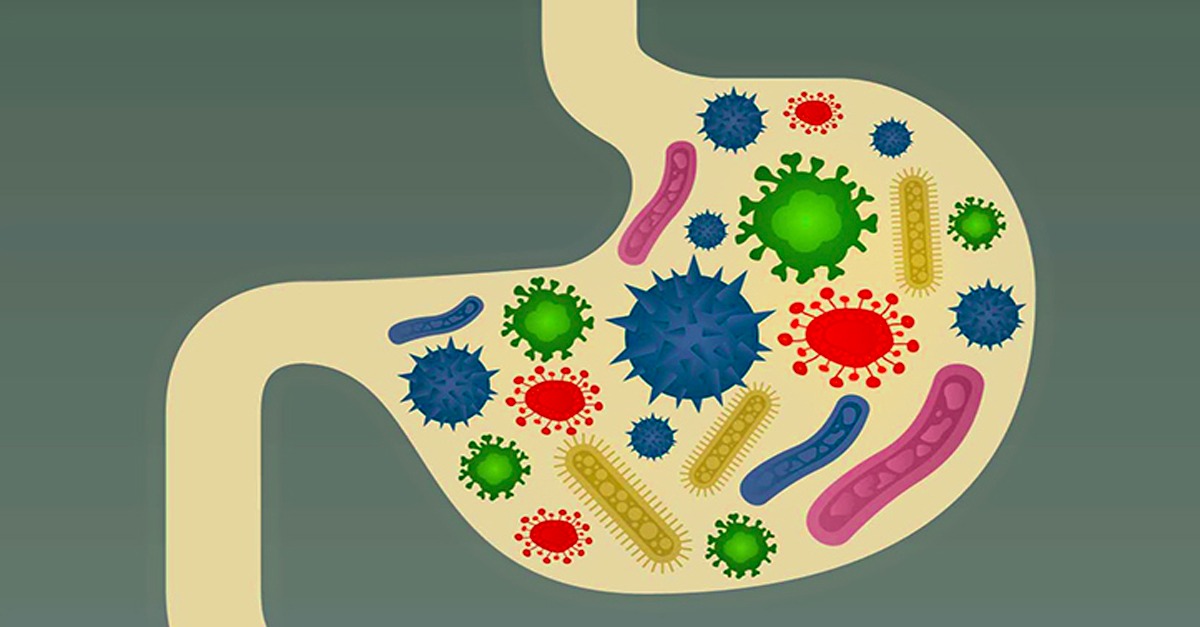
Healthy gut bacteria, your #1 priority for well-being and longevity.
Weeds Weeds Weeds!
Farmers use Glyphosate to kill weeds and dry out crops just before harvest. However this kills just about everything, both the weeds and the crop. The good news is that farmers get a bigger yield, because all the seeds dry out at the same time. This means higher productivity and more money. But Glyphosate is absorbed into the seeds we eat, both GMO and non-GMO. GMO crops already have Glyphosate embedded in the seed of the plant. Non-GMO crops sprayed with Glyphosate also become toxic. In both cases Glyphosate poisons our food.
Common Sources of Hidden Glyphosate:
- Avoid these primary GMO ingredients including all soy, corn, and canola.
- Avoid all non-organic cereals and grains, which are harvested with glyphosate, including wheat, barley, buckwheat, millet, rice, oats, rye, sorghum, wild rice, popcorn, and teff.
- Avoid additives such as corn syrup, maltodextrin, fructose, baking powder, natural flavors, and cornstarch.
- Avoid all non-organic canola oil. (such as non-GMO canola oil used in Whole Foods Deli)
- Skip prepared foods high in glyphosate include bread, muffins, and crackers, snacks.
- Avoid sweets such as cookies, pastries, bars, sugar, cane sugar, beet sugar, corn sugar, chewing gum, and high fructose corn syrup.
- Fruits and veggies to avoid include non-organic varieties of papaya, zucchini, summer squash, potatoes, apples, oranges, lentils, beans, peppermint, spearmint, peas, instant tea, and spices.
- All animal foods (alfalfa, corn, hay, fodder, and soy) as well as the resulting meats, poultry, dairy and eggs, contain glyphosate.
- Prepared foods with glyphosate include bread, potato chips, corn chips, multi-grain chips, popcorn, soy sauce, soy milk, rice milk, almond milk, corn tortillas, olive oil, and canned fish in soy oil.
- Nuts such as almonds and sunflower seeds may contain glyphosate.
- Avoid prepared foods labeled just “organic”, as they may legally contain up to 5% non-organic ingredients. Instead look for prepared foods marked “100% organic”. Better yet, skip prepared foods altogether and cook from scratch.
- Avoid grass-fed or pastured meats, eggs, and dairy products, as they can legally be finished or supplemented with GMO soy and corn, which are raised with glyphosate. Instead look for grass-fed grass-finished meats, grass fed dairy, organic chicken, organic eggs.
Grocery shopping has changed dramatically in the past 20 years. Shopping with knowledge and discernment is essential for your health.
According to Joseph E. Pizzorno, founding president of Bastyr University and former advisor to President Clinton on complementary and alternative medicines, toxins in the modern food supply are now “a major contributor to, and in some cases the cause of, virtually all chronic diseases.”
Pizzorno points out that our modern food supply also hampers your body’s detoxification process as a result of being deficient in key nutrients. In addition to that, the Centers for Disease Control and Prevention (CDC) has admitted that, conversely to what researchers originally thought, the vast majority of diseases do NOT appear to have a genetic origin. Rather the majority 90 percent—are the result of environmental causes, which includes exposure to pesticides and other diet-related toxins.
What is Glyphosate?
Glyphosate is now the #1 herbicide used in the US and increasingly used around the world. It inhibits an enzyme in the gut called the shikimate pathway, involved in synthesis of 3 amino acids. Monsanto argues that glyphosate is harmless to humans, because we do not have the shikimate pathway. However our beneficial gut bacteria DO have this pathway, and we depend on them to supply us with essential amino acids (among other things). Other ingredients in Roundup greatly increase Glyphosate’s toxic effects, which bio-accumulate over time. Monsanto’s calls Glyphosate “safe” after studies that lasted only 3 months. Yet the negative effects won’t show up until much later. Some of us have been bio-accumulating the toxin in our bodies for over 20 years.
Shocking Increase in Chronic Disease
Within the same 20 years there has been an alarming increase in serious illnesses in the US, along with a marked decrease in life expectancy (Bezruchka, 2012). The CDC, Center for Disease Control and Prevention (CDC) estimates that the cost of diabetes and diabetes-related treatment was approximately $116 billion dollars in 2007. Estimated costs related to obesity were $147 billion in 2008 and cardiovascular diseases and stroke were $475.3 billion in 2009. Health care expenditures in the US totaled $2.2 trillion dollars in 2007. The onset of serious illness is appearing in increasingly younger cohorts.
Poor Health Statistics in USA Compared to Other Countries
Disease The US leads the world in the increase in deaths due to neurological diseases between 1979-81 and 2004-06 for the 55-65 age group (Pritchard et al., 2013). These neurological disorder deaths are more typical of the over 65 age group. There have been similar findings for obesity, asthma, behavior and learning problems, and chronic disease in children and young adults (Van Cleave et al., 2010). Type II diabetes in youth is being called an epidemic (Rosenbloom et al., 1999). The rate of chronic disease in the entire US population has been dramatically increasing with an estimated 25% of the US population suffering from multiple chronic diseases (Autoimmunity Research Foundation, 2012). These findings suggest environmental triggers rather than genetic or age-related causes.
Glyphosate Applications Began in the Mid 1990’s
During this same time period, there has been an exponential increase in the amount of glyphosate applied to food crops and in the percentage of GE food crops planted (Benbrook, 2012). In the most detailed analysis yet performed on the correlation between the use of glyphosate and rates of chronic diseases, a team of scientists including Dr. Nancy Swanson, the President of the International Federation of Organic Agriculture Movements (IFOAM), Andre Leu, identified a serious link between the increase in the use of glyphosate in the U.S. and diseases such as diabetes, obesity, lipoprotein metabolism disorder, Alzheimer’s, senile dementia, Parkinson’s, multiple sclerosis and autism. See: Genetically engineered crops, glyphosate and the deterioration of health in the United States of America.
Several graphs have been inserted thanks to the work of immunologist Dr. Nancy Swanson, whose data uses Pearson Correlation to link disease and Roundup. A very high level of correlation and P-value has been found for all these diseases.
-
Autism
In 1970, one in every 10,000 children was diagnosed with autism. By the year 2000, 1 in 100 children in the US were diagnosed with autism. By 2013 it was one in 50. In 2015, it was up to 1 in 45. Scientists estimate at the current rate of increase by 2025 it will be one in every 2 children.
Common signs of Autism include disrupted gut bacteria, impaired balance of sulfur metabolites (especially sulphate) in the gut, low serum sulfate, methionine, serotonin, zinc, iron, and melatonin deficiency, impaired immune function, inflammatory bowel, and low-grade brain inflammation. Glyphosate’s deadly combination of chemicals disrupts gut bacteria, depletes essential amino acids and minerals, and interferes with cytochrome P450 enzymes.
 “Glyphosate may be the most important factor in the U.S. health crisis related to Autism, Obesity, Alzheimer’s disease and infant mortality.” Dr. Stephanie Seneff, MIT researcher
“Glyphosate may be the most important factor in the U.S. health crisis related to Autism, Obesity, Alzheimer’s disease and infant mortality.” Dr. Stephanie Seneff, MIT researcher
Dr. Stephanie Seneff, senior research scientist at the MIT Computer Science and Artificial Intelligence Laboratory is one of the all-too-rare scientists who are trying to ask the questions and connect the dots. Using computer science and natural language processing (NLP) to understand the impact of environmental toxins on human health.
She has developed some particularly convincing hypotheses relating to autism and cancer. At the Third International Symposium on Vaccines, presented in March 2014 as part of the 9th International Congress on Autoimmunity, Dr. Seneff was one of 15 speakers invited to present scientific research by the Children’s Medical Safety Research Institute (CMSRI) on the adverse health effects of aluminum adjuvants and aluminum-adjuvented vaccines. Dr. Seneff discussed “a role for the pineal gland in neurological damage following aluminum-containing vaccination.”
The Critical Role of Sulfate in Autism
Dr. Seneff persuasively makes the case that neurological brain diseases have a common origin that begins with an insufficient supply of sulfate to the brain. Sulfate is the oxidized form of sulfur. Dr. Seneff has argued that systemic sulfate deficiency “may be the most important factor in many of the health issues facing us today.” Insufficient sulfate in the brain impairs its ability to eliminate heavy metals and other toxins. To make matters worse, those same toxic metals also interfere with sulfate synthesis. The net result can be an accumulation of cellular debris.
How do our brains get rid of cellular debris? Dr. Seneff cited recent research showing that sleep is crucial in this regard. Sleep is the brain’s “housekeeper.”
This housekeeping takes place in the lysosomes. (Lysosomes—the cell’s waste disposal system—are filled with enzymes that break down unwanted materials.) However, the lysosomes cannot perform their important clearing work without sulfate, specifically heparan sulfate. This is perhaps the most important missing link in the Autism confusion. See below the correlation of children with autism and application of glyphosate. 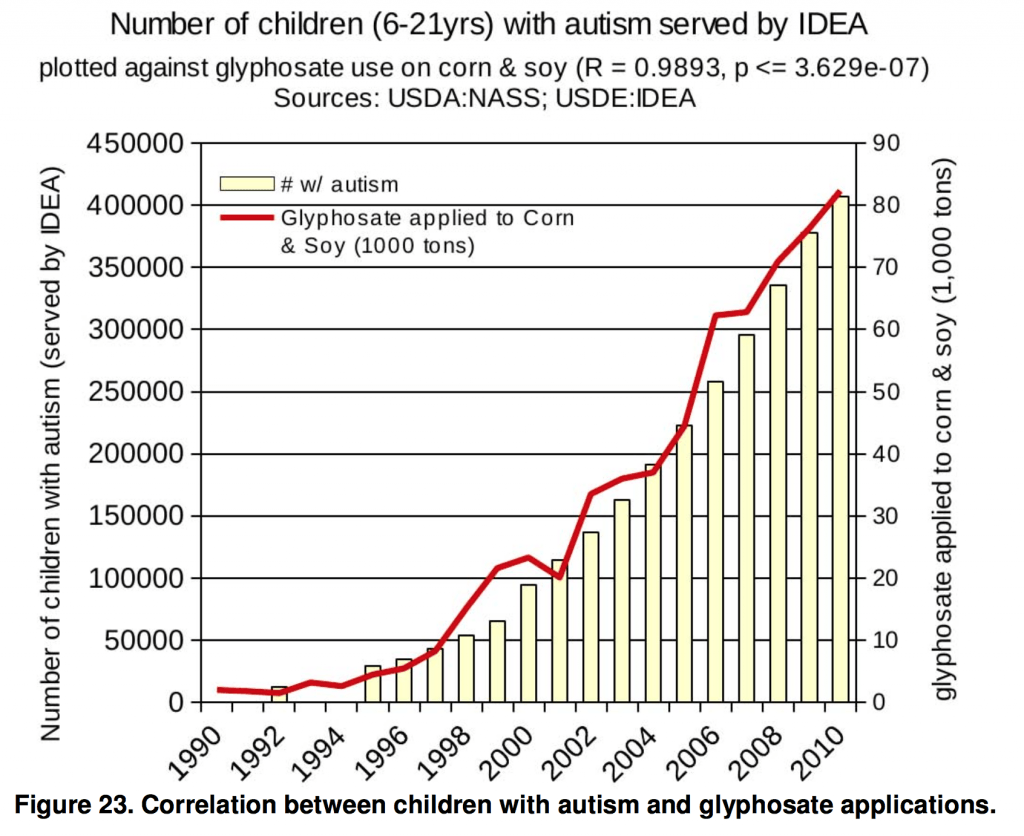
2. Obesity
 Childhood obesity has more than doubled in children and quadrupled in adolescents in the past 30 years. An experiment involving the transfer of a strain of endotoxin-producing bacteria from the gut of an obese human to the guts of mice caused the mice to become obese. Since glyphosate induces a shift in gut bacteria towards endotoxin-producers, glyphosate exposure may contribute to obesity in this way. Glyphosate can cause an overgrowth of pathogenic bacteria in the gut.
Childhood obesity has more than doubled in children and quadrupled in adolescents in the past 30 years. An experiment involving the transfer of a strain of endotoxin-producing bacteria from the gut of an obese human to the guts of mice caused the mice to become obese. Since glyphosate induces a shift in gut bacteria towards endotoxin-producers, glyphosate exposure may contribute to obesity in this way. Glyphosate can cause an overgrowth of pathogenic bacteria in the gut. 
3. Diabetes
In 2012 according to the CDC, 29.1 million people or 9.3% of the population have diabetes. Incidence of diabetes has increased almost 400% since 1980, with a huge increase in the mid 1990’s, exactly parallel to increased usage of glyphosate on crops. Increasing evidence links the widespread exposure to organophosphate (OP) pesticides to the global epidemics of type 2 diabetes and obesity. Low levels of testosterone are a risk factor for Type 2 diabetes. Rats fed Roundup over a period of 30 days spanning the onset of puberty showed reduced testosterone production, poor testicular development, and delayed onset of puberty.
4. Alzheimer’s and Dementia
Studies show that Monsanto’s Roundup causes the same type of oxidative stress and neural cell death observed in Alzheimer’s disease. Glyphosate affects CaMKII, an enzyme when out of balance may lead to Alzheimer’s.
5. Celiac disease
Celiac disease has quadrupled in the US in the past 50 years. It is estimated that celiac disease affects one in every 133 people. And gluten sensitivity potentially affects far more people than celiac disease. Roughly 6% to 7% of the U.S. population may be gluten-sensitive, meaning some 20 million people in the United States alone could have the condition. 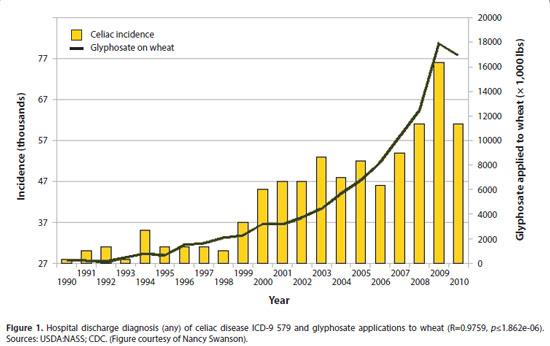
6. Hypertension (high blood pressure)
Immunologist Dr. Nancy Swanson has showed a direct correlation between hypertension and the use of glyphosate on corn and soy since 1979. 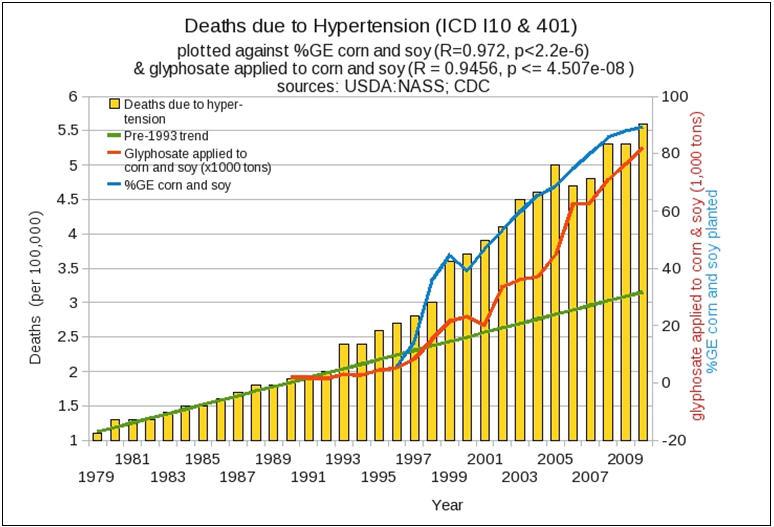
7. Infertility
Male fertility is declining, and for years researchers have been trying to figure out why. The numbers may seem shocking, but between 60-80 million couples around the world are having a difficult time conceiving, and there is a likely culprit, especially considering evidence arising from the latest study published at Science Direct.
In the Journal of Reproductive Toxicology, titled Glyphosate impairs male offspring reproductive development by disrupting gonadotropin expression: “The study shows, for the first time, the effects on the reproductive development of male offspring from dams treated with glyphosate only in the perinatal period. We conclude that the exposure promotes behavioral changes and histological and endocrine problems in reproductive parameters and these changes are reflected by a hyperse-cretion of androgens and increased gonadal activity, sperm production and libido.”
Titled, “Potential pathways of pesticide action on erectile function – A contributory factor in male infertility,” the study shows that along with heavy metals, radioactivity, and poisonous chemical fumes, that pesticides are largely contributing to erectile dysfunction and the downfall of male fertility.
8. Cancer, Lymphoma, and Leukemia
Pesticide use in homes has been linked to increased risk of childhood leukemia or cancer, a new report suggests. Researchers combined data from 16 earlier studies that had compared pesticide exposure between children who developed leukemia or lymphoma and those who did not. These studies analyzed the level of insecticides and herbicides both inside the home and in the yard and outdoor residential space. The researchers concluded that children who had been exposed to insecticides indoors were 47% more likely to have leukemia and 43% more likely to have lymphoma or leukemia, the most common childhood cancers.
Surveys of 65,000 people in farming communities in Argentina where Roundup is used, found cancer rates two to four times higher than the national average, with increases in breast, prostate and lung cancers. The high cancer rates among people exposed to Roundup likely stem from glyphosate’s known capacity to induce DNA damage, which has been demonstrated in numerous lab tests.
Brain cancer: In a study of children with brain cancer compared with healthy children, researchers found that if either parent had been exposed to Roundup during the two years before the child’s birth, the chances of the child developing brain cancer were doubled. 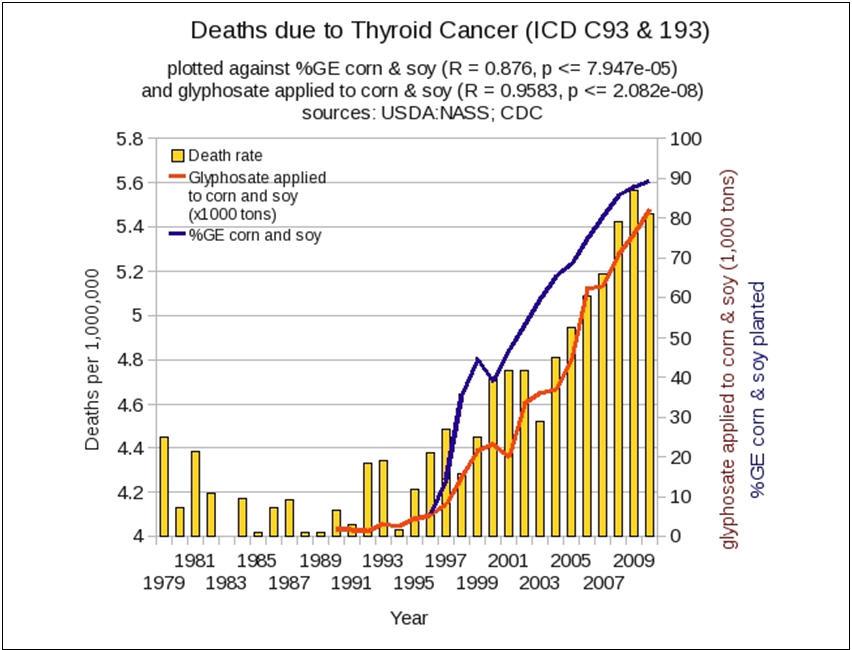
9. ADHD, Loss of Brain function, Lower IQ in Children
Dr. David Bellinger, professor of Neurology at Harvard Medical School, estimates Americans have lost a total of 16.9 million IQ points due to exposure to pesticides.
 In 2013 one in 10 American children had ADHD, which represents a 22% increase from 2003. ADHD involves a cluster of symptoms that include inattention, hyperactivity, and impulsive behaviors. Children with ADHD often struggle in school and have difficulty managing interpersonal relationships.
In 2013 one in 10 American children had ADHD, which represents a 22% increase from 2003. ADHD involves a cluster of symptoms that include inattention, hyperactivity, and impulsive behaviors. Children with ADHD often struggle in school and have difficulty managing interpersonal relationships.
Glyphosate-contaminated food has recently been implicated in the dramatic rise of ADHD and autism. Both problems tend to involve abnormal gut flora, and this is where glyphosate begins its path of destruction.
Evidence confirms severe brain damage can be caused by early childhood exposure to glyphosate, heavy metals, and other neuro-toxins. Exposure to neurotoxins can cause permanent, untreatable brain damage, resulting in reduced IQ scores and disruption in behavior.
Children exposed in the womb to substantial levels of neurotoxic pesticides have measurably lower IQ’s by the time they enter school than do kids with virtually no exposure.
10. Multiple sclerosis
An increased incidence of inflammatory bowel disease (IBS) has been linked to multiple sclerosis, and Glyphosate may be a causal factor. Glyphosate-induced IBS may cause gut bacteria to leak into the blood stream, triggering an immune reaction and consequently an autoimmune disorder resulting in destruction of the myelin sheath.
11. Auto-immune diseases
Autoimmune illness is now at epidemic proportions—nearly 24 million Americans as of 2012. We are now seeing a fairly dramatic increase in the incidence of various autoimmune conditions, including type-1 diabetes, rheumatoid arthritis, and lupus erythematosus. This new research suggests that, changes in gut bacteria pave the way for autoimmune disease. The human microbiome is sensitive to a variety of environmental factors including food choices, antibiotic usage, other medications, including nonsteroidal anti-inflammatory drugs, and exposure to glyphosate, The point is, when we alter the balance of bacteria that live within us, we set the stage for our most dreaded diseases.
12. Depression
 Glyphosate promotes depression in all ages, by disrupting the brain’s production of serotonin and melatonin. These are important neurotransmitters that regulate mood, appetite and sleep. Serotonin impairment has been linked to depression. Melatonin dysfunction has been linked to all kinds of brain issues, mainly poor sleep cycles. The NIMH estimates that in the United States, 16 million adults had at least one major depressive episode in 2012. That’s 6.9 percent of the population. According to the World Health Organization (WHO), 350 million people worldwide suffer from depression. It is a leading cause of disability.
Glyphosate promotes depression in all ages, by disrupting the brain’s production of serotonin and melatonin. These are important neurotransmitters that regulate mood, appetite and sleep. Serotonin impairment has been linked to depression. Melatonin dysfunction has been linked to all kinds of brain issues, mainly poor sleep cycles. The NIMH estimates that in the United States, 16 million adults had at least one major depressive episode in 2012. That’s 6.9 percent of the population. According to the World Health Organization (WHO), 350 million people worldwide suffer from depression. It is a leading cause of disability.
13. Cardiovascular diseases and stroke
Glyphosate can disrupt the body’s enzymes, causing lysosomal dysfunction. Lysosomes—the cell’s waste disposal system—are filled with enzymes that break down unwanted materials. This means that the waste-removal function of cells is impaired. Lysosomes can digest excess or worn out organelles, food particles, and engulf pathogenic viruses or bacteria. Impaired waste removal is a major factor in cardiovascular disease and heart failure.
14. Kidney disease (Renal disease)
A new study has just been published showing that farmers in Sri Lanka exposed to glyphosate through drinking water are 5 times more likely to develop chronic kidney failure than those who don’t drink herbicide-polluted water.
Farmers in this part of the world often wear scant protection when spraying glyphosate on their rice fields, but it seems that this protection is not enough. The fact that Round Up has contaminated their drinking water is an example of how multi-tiered the problem of herbicidal toxicity truly is. 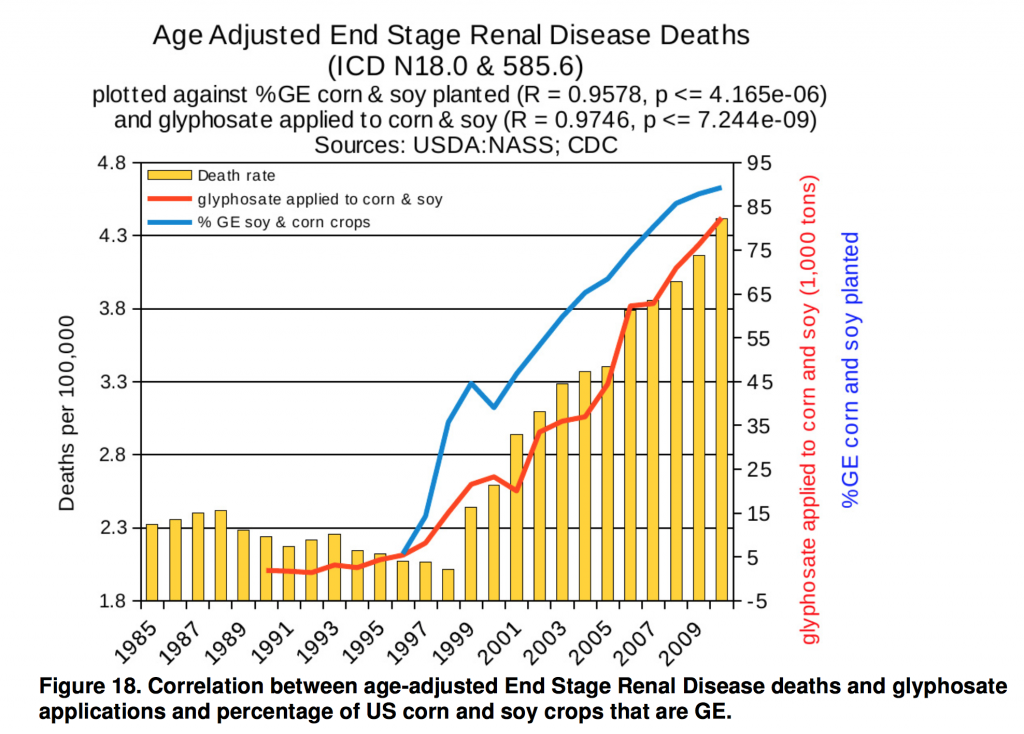
15. Inflammatory bowel disease
There has been a dramatic increase in hospitalizations of US children with inflammatory bowel disease. A study by Case Western Reserve University School of Medicine showed a49% increase in Crohn’s disease hospitalizations and 71% increase in ulcerative colitis hospitalizations.
The gut-brain axis links neurological disorders with gut disorders. Scientists believe that glyphosate is a major cause. 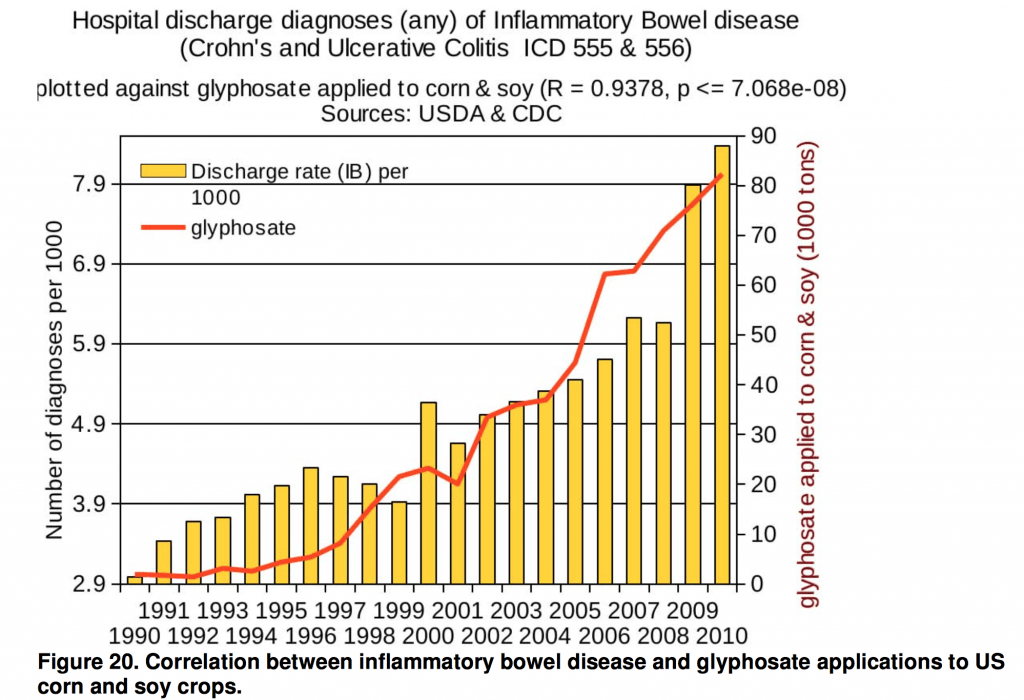
16. Parkinson’s disease
Brain-damaging effects of herbicides have recently been recognized as the #1 environmental factor associated with neuro-degenerative disorders such as Parkinson’s disease. The onset of Parkinson’s following exposure to glyphosate has been well documented, and lab studies show that glyphosate induces the cell death characteristic of the disease.
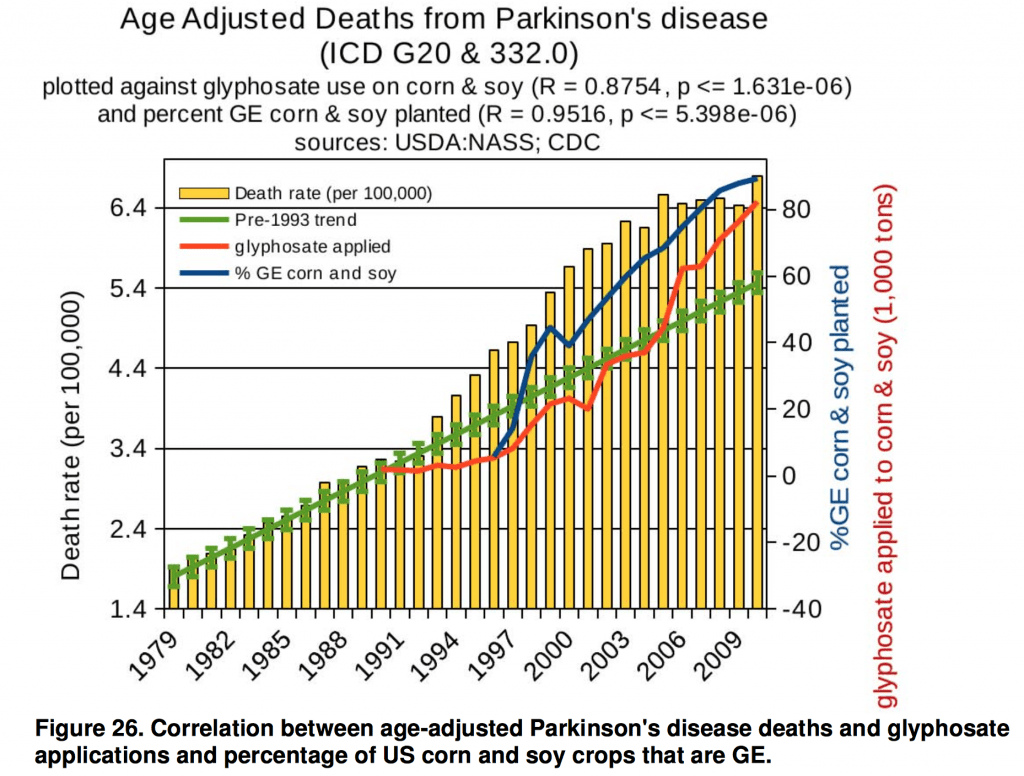
Sources:
- Neurology, April 2007;68(5):326-337
- Office on Women’s Health, U.S. Department of Health and Human Services, July 16, 2012
- AlterNet, March 18, 2008
- Stephanie Seneff Bio
- Third International Symposium on Vaccines
- Children’s Medical Safety Research Institute
- S Seneff. Roundup®: The “nontoxic” chemical that may be destroying our health. Wise Traditions 2013;14(3):30-38
- Science, 2013;342(6156):373-377
- Wise Traditions, 2013;14(3):30-38
- Biochemical Journal, 1992;286:717-720
- PNAS, 2012;109(13):5052-5056
- Medscape. September 4, 2013
- Behavioural Brain Research, 2013;243:138-145
- Neuroscience Letters, 2012;506(2):208-213
- Wise Traditions, 2013;14(4):23-31
- The Journal of Biological Chemistry, 2004;279:5053-5054
- Behavioural Brain Research, 2013;243:138-145
- Neuroscience Letters, 2012;506(2):208-213
- Endocrinology, 2002;143(1):84-90
- Bioelectrochemistry and Bioenergetics, 1996;41:191-195
- Lupus, 2012;21:223-230
- Immunol Res, 2013;56(2-3):304-16
- International Journal of Environmental Research and Public Health, 2013;10(8):3771-3800
- Entropy, 2012;14:2227-2253
- Nanomedicine: Nanotechnology, Biology and Medicine, 2013;9(2):212-221
- Sulfate, Sleep and Sunlight: The Disruptive and Destructive Effects of Heavy Metals and Glyphosate
- Glyphosate herbicide and toxic heavy metals act like “binary weapon” to destroy kidneys
- From “Consumer Groups Initiate Private Glyphosate Testing in US”, by Dr. Joseph Mercola
- “4 Strange Sources of Roundup” by Leah Zerbe, online editor for com
- http://articles.mercola.com/sites/articles/archive/2014/05/08/heavy-metals-glyphosate-health-effects.aspx
- 9 Sneaky Sources of GMO’s, from Rodale’s Organic Life
- http://articles.mercola.com/sites/articles/archive/2015/05/05/glyphosate-residue-testing.aspx
- http://www.mariasfarmcountrykitchen.com/strange-sources-of-roundup/
- Glyphosate, Hard Water and Nephrotoxic Metals: Are They the Culprits Behind the Epidemic of Chronic Kidney Disease of Unknown Etiology in Sri Lanka?
- 10http://articles.mercola.com/sites/articles/archive/2013/06/09/monsanto-roundup-herbicide.aspx
- http://sustainablepulse.com/2014/11/07/new-study-huge-increase-us-chronic-diseases-linked-glyphosate-herbicides/#.VwHo5XjR3dl
- http://www.organic-systems.org/journal/92/JOS_Volume-9_Number-2_Nov_2014-Swanson-et-al.pdf
- http://naturalsociety.com/new-study-pesticides-a-major-cause-of-infertility-male-erectile-dysfunction/
- http://www.cnn.com/2015/09/14/health/pesticide-exposure-childhood-cancer/
- http://www.wired.com/2011/04/pesticides-children-intelligence/
- Harmful chemicals and neurotoxins: Silently eroding intelligence, damaging societies
- https://writix.co.uk/blog/health-problems-linked-to-monsanto-roundup
- http://articles.mercola.com/sites/articles/archive/2013/12/05/adhd-glyphosate.aspx
- https://people.csail.mit.edu/seneff/WAPF_Slides_2012/Offsite_Seneff_Handout.pdf
- http://www.collective-evolution.com/2014/04/08/10-scientific-studies-proving-gmos-can-be-harmful-to-human-health/




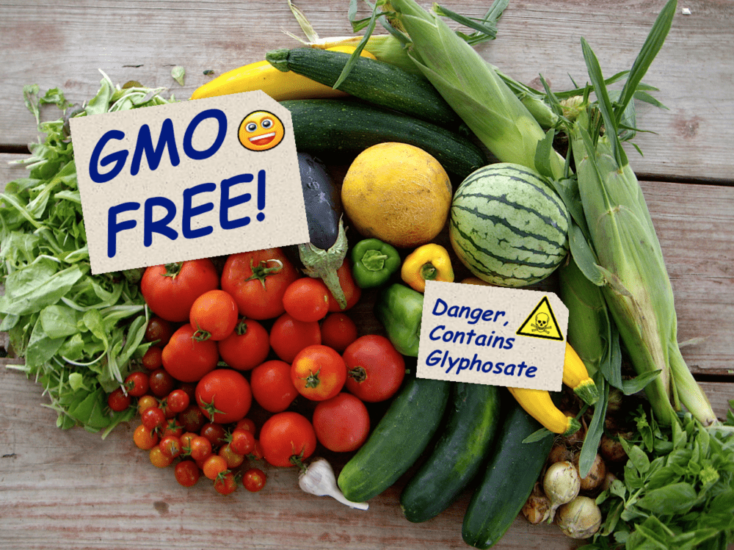



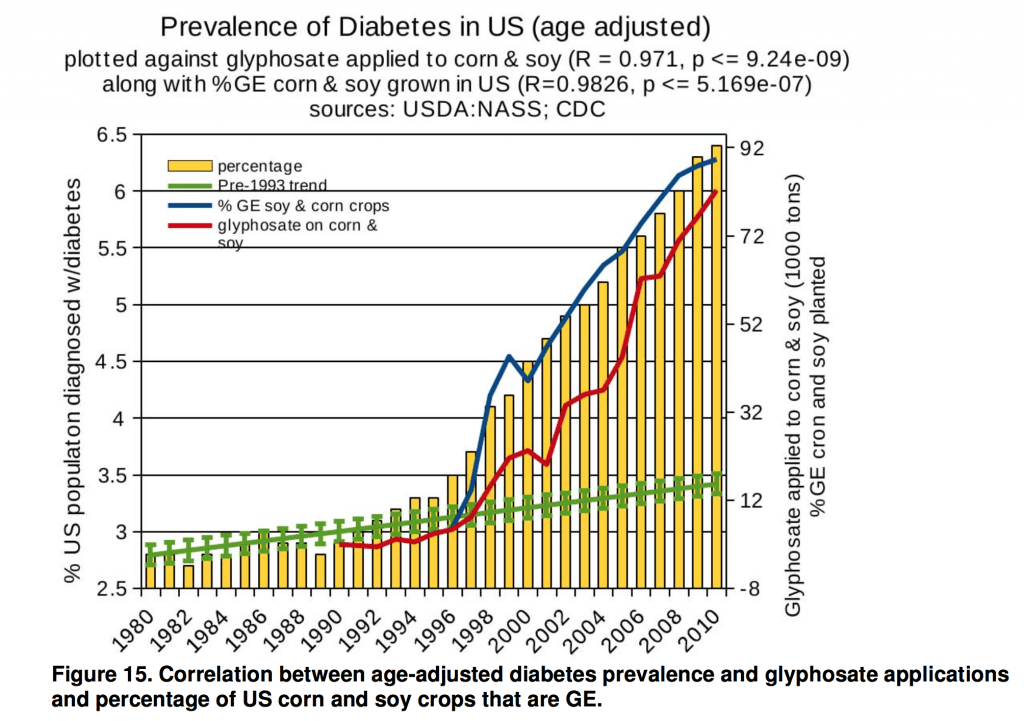

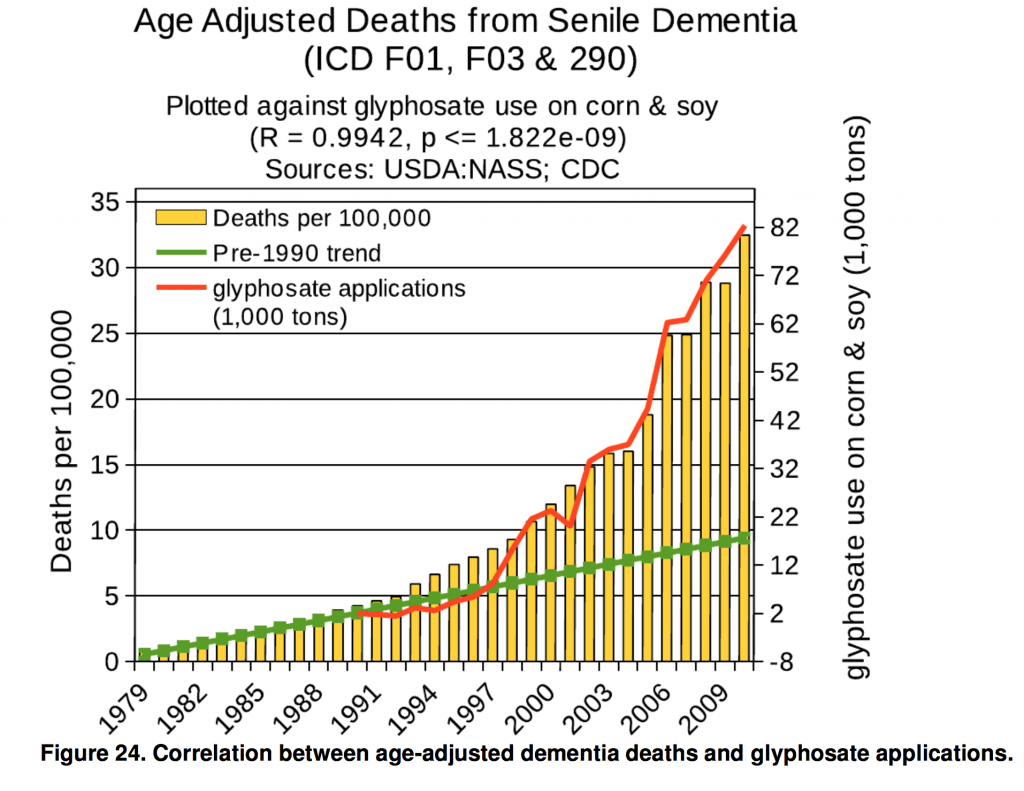



No Replies to "Is GMO-free Safe to Eat? NO! Many non-GMO foods harvested with Glyphosate!"